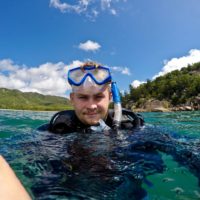Jake Lowe
PhD candidate
James Cook University

From 2005 to 2022, the main node of the ARC Centre of Excellence for Coral Reef Studies was headquartered at James Cook University in Townsville, Queensland (Australia)








Jake grew up less than 500m from the Noosa River on the Sunshine Coast, Queensland and spent much of his youth on the water fishing, surfing and diving. Going for a fish before the school bus arrived at 7:30am wasn’t unusual for Jake, as the proximity of his family home to the river enabled Jakes love of all things marine to blossom from an early age. Jake pursued his dream to work with marine fishes and moved to Townsville in 2013 to complete a Bachelor of Science, majoring in Marine Biology. After getting a taste for Fisheries Science during undergrad, in 2016 Jake embarked on a Graduate Certificate of Research Methods supervised by Professor Garry Russ where he investigated the effects of no-take marine reserve protection and benthic habitat drivers on the density of tropical wrasses in the Philippines. This research led Jake to start his Master’s Degree supervised by Professor Garry Russ and Emeritus Professor Howard Choat which delved deeper into the biology of wrasses investigating the effects of fishing on the life-history characteristics of tropical wrasses. Thanks to collaboration with Dr. David Williamson in 2018 Jake decided to upgrade his Masters research to a PhD and also partition the effects of benthic habitat and no-take marine reserve protection on the density, diversity, size structure and biomass of tropical wrasses on the inshore Great Barrier Reef. Jakes findings could potentially improve management of reef fisheries and the conservation of coral reef environments.
New DNA techniques are being used to understand how coral reacted to the end of the last ice age in order to better predict how they will cope with current changes to the climate. James Cook Univer
A new study on the effects of climate change in five tropical countries has found fisheries are in more trouble than agriculture, and poor people are in the most danger. Distinguished Profess
James Cook University researchers have found brightly coloured fish are becoming increasingly rare as coral declines, with the phenomenon likely to get worse in the future. Christopher Hemingson, a
Researchers working with stakeholders in the Great Barrier Reef region have come up with ideas on how groups responsible for looking after the reef can operate more effectively when the next bleaching
Abstract: As marine species adapt to climate change, their heat tolerance will likely be under strong selection. Individual variation in heat tolerance and its heritability underpin the potential fo
Abstract: The Reef Ecology Lab in KAUST’s Red Sea Research Center explores many aspects of movement ecology of marine organisms, ranging from adult migrations to intergenerational larval dispersal
Abstract: Macroalgal meadows are a prominent, yet often maligned component of the tropical seascape. Our work at Ningaloo reef in WA demonstrate that canopy forming macroalgae provide habitat for ad
Abstract: Sharks are generally perceived as strong and fearsome animals. With fossils dating back at least 420 million years, sharks are not only majestic top predators but they also outlived dinosa
Abstract: Connectivity plays a vital role in many ecosystems through its effects on fundamental ecological and evolutionary processes. Its consequences for populations and metapopulations have been
Abstract: Evolution of many eukaryotic organisms is affected by interactions with microbes. Microbial symbioses can ultimately reflect host’s diet, habitat range, and even body shape. However, how
Abstract: The past few years have seen unprecedented coral bleaching and mortality on the Great Barrier Reef (GBR) but the consequences of this on biodiversity are not yet known. This talk will expl